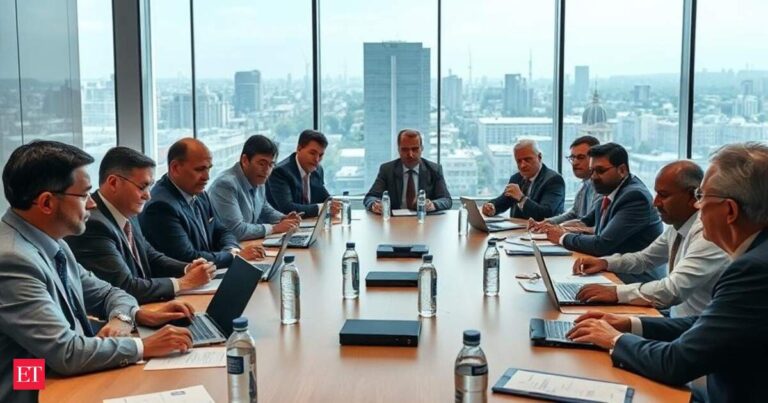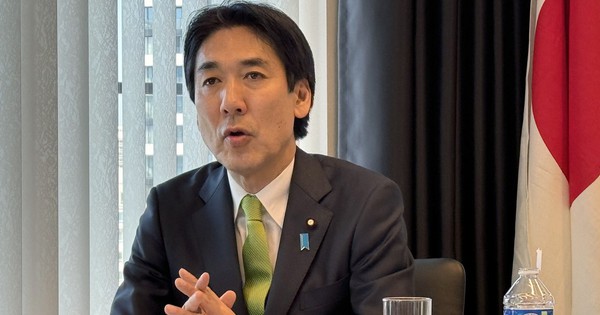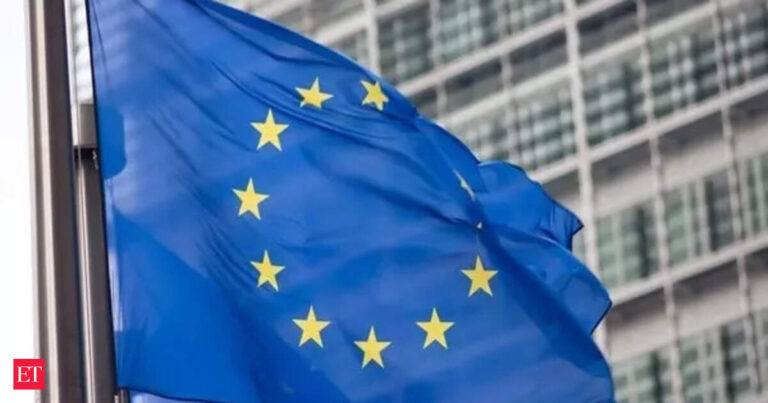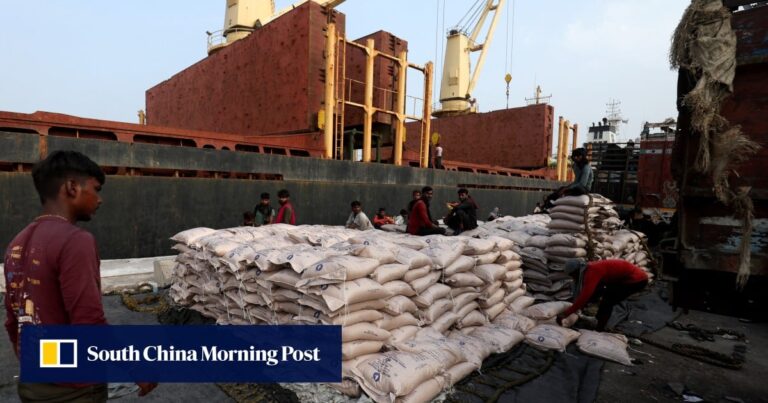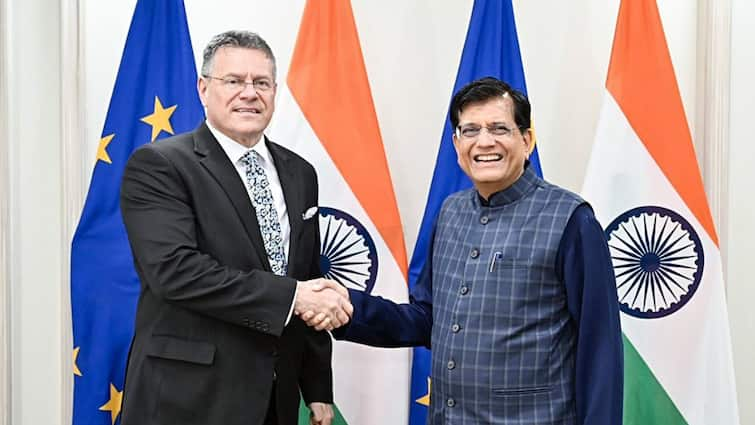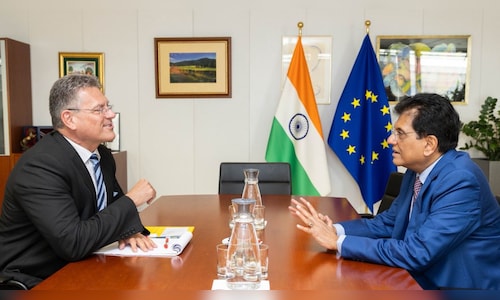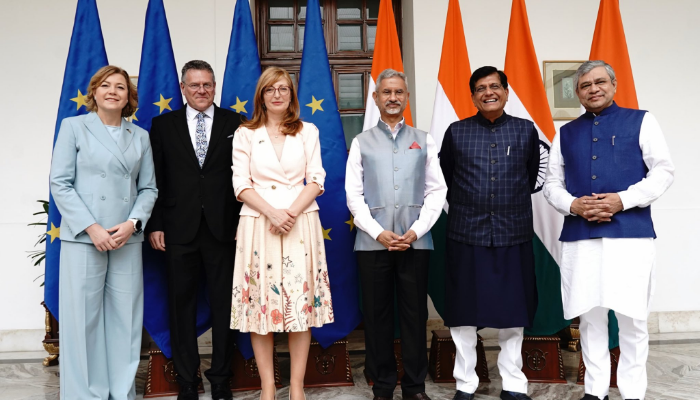

The Ministers of India with representatives of the European Commission
India and the European Union held the second ministerial meeting of Trade and Technology Council (TTC) on Friday and underlined the promotion of prosperity thanks to trade and closer investment links between the two parties. They also examined the work carried out on questions related to trade, green energy, digitization and explored new opportunities in sectors such as semiconductors, artificial intelligence and 6G telecommunications.
India-EU TTC was created in April 2022 to meet the challenges of the Confluency of Trade, Trust Technology and Security. The first meeting of India-EU TTC was held in Brussels on May 16, 2023.
The ministerial meeting of the TTC provided political advice for the path to follow. Subsequently, on November 24, 2023, a stock -out meeting in virtual mode examined the progress made by the three working groups TTC.
“The TTC reflects a shared recognition between the EU and India, the increasingly critical links between trade and technology, the potential for cooperation on these issues to improve the savings of both partners, and the need to work together on related security challenges. A joint declaration published after the second meeting of the Indian Council-EU Trade and Technology, said.
The meeting was co -signed on the Indian side by the Minister of External Affairs, Dr. S. Jaishankar, the Minister of Commerce and Industry Piyush Goyal, and the Minister of Electronics and Information Technologies Ashwini Vahnaw. The executive vice-president of technological sovereignty, security and democracy Henna Virkkunen, Commissioner for commercial security and economic security, interinstitutional and transparency, Maros Šefčovič and commissioner for startups, research and innovation, Ekadrina Zaharieva has co-chaired on the side of the EU.
During the meeting, two parties agreed to develop chains of transparent, diversified, secure and sustainable value chains. Domains of interest include agro-food, active pharmaceutical ingredients (API) and clean technologies, the two parties rushing to promote collaboration efforts to meet global challenges and guarantee long-term economic stability.
In the field of agriculture, the two parties have agreed to work together on food security, resilient climate practices, the diversification of cultures and improvements in infrastructure. “In agriculture, India and the EU intend to collaborate on the planning of the contingency for food security and welcome to common efforts on shared research and innovations concerning resilient climate practices, the diversification of cultures and infrastructure improvements, as they are favored for cooperation thanks to the framework of the G20”, maintained the joint declaration.
In the pharmaceutical sector, the two parties have agreed to improve the transparency and safety of the supply chains of active pharmaceutical ingredients (API) by mapping vulnerabilities, promoting sustainable manufacturing and establishing early alert systems to avoid disturbances.
The two parties, during the meeting, admitted that the cooperation of clean technologies is focused on strengthening supply chains for solar energy, offshore wind and clean hydrogen by exchanging information on sectoral capacities and investment incentives and research, development and innovation priorities.
In this regard, they also discussed approaches to minimize commercial barriers and explore possible synergies of supply chains. They agreed to promote investment, exchange best practices and mitigate risks through regular dialogues, research collaborations and business commitments to business, ensure the resilience of the supply chain and sustainable economic growth.
The EU welcomed India’s approval for the marketing of several plant products, while India appreciated the list by the EU of Indian aquaculture establishments. The two parties are determined to solve the pending problems thanks to a continuous commitment in the context of the TTC.
On foreign direct investments, both parties have accepted best practices in the selection of foreign direct investments, which is an area of growing importance to promote economic security.
India and the EU have reaffirmed their solid support for a multilateral trading system, in particular the World Trade Organization (WTO). They highlighted the need for WTO reforms to more effectively meet global challenges, emphasizing the guarantee of a system for the settlement of functional disputes. The two parties agreed to improve their dialogue to obtain concrete results at the next ministerial conference of the WTO (MC14).
The two parties had in -depth discussions on trade and decarbonization through several bilateral channels and jointly engaged with stakeholders, in particular the implementation of the EU carbon border mechanism (CBAM). The two parties discussed the challenges resulting from the implementation of the CBAM, in particular for small and medium -sized enterprises and agreed to continue to resolve them.
India-EU TTC was created in April 2022 to meet the challenges of the Confluency of Trade, Trust Technology and Security. The first meeting of India-EU TTC was held in Brussels on May 16, 2023.
The ministerial meeting of the TTC provided political advice for the path to follow. Subsequently, on November 24, 2023, a stock -out meeting in virtual mode examined the progress made by the three working groups TTC.
“The TTC reflects a shared recognition between the EU and India, the increasingly critical links between trade and technology, the potential for cooperation on these issues to improve the savings of both partners, and the need to work together on related security challenges. A joint declaration published after the second meeting of the Indian Council-EU Trade and Technology, said.
The meeting was co -signed on the Indian side by the Minister of External Affairs, Dr. S. Jaishankar, the Minister of Commerce and Industry Piyush Goyal, and the Minister of Electronics and Information Technologies Ashwini Vahnaw. The executive vice-president of technological sovereignty, security and democracy Henna Virkkunen, Commissioner for commercial security and economic security, interinstitutional and transparency, Maros Šefčovič and commissioner for startups, research and innovation, Ekadrina Zaharieva has co-chaired on the side of the EU.
During the meeting, two parties agreed to develop chains of transparent, diversified, secure and sustainable value chains. Domains of interest include agro-food, active pharmaceutical ingredients (API) and clean technologies, the two parties rushing to promote collaboration efforts to meet global challenges and guarantee long-term economic stability.
In the field of agriculture, the two parties have agreed to work together on food security, resilient climate practices, the diversification of cultures and improvements in infrastructure. “In agriculture, India and the EU intend to collaborate on the planning of the contingency for food security and welcome to common efforts on shared research and innovations concerning resilient climate practices, the diversification of cultures and infrastructure improvements, as they are favored for cooperation thanks to the framework of the G20”, maintained the joint declaration.
In the pharmaceutical sector, the two parties have agreed to improve the transparency and safety of the supply chains of active pharmaceutical ingredients (API) by mapping vulnerabilities, promoting sustainable manufacturing and establishing early alert systems to avoid disturbances.
The two parties, during the meeting, admitted that the cooperation of clean technologies is focused on strengthening supply chains for solar energy, offshore wind and clean hydrogen by exchanging information on sectoral capacities and investment incentives and research, development and innovation priorities.
In this regard, they also discussed approaches to minimize commercial barriers and explore possible synergies of supply chains. They agreed to promote investment, exchange best practices and mitigate risks through regular dialogues, research collaborations and business commitments to business, ensure the resilience of the supply chain and sustainable economic growth.
The EU welcomed India’s approval for the marketing of several plant products, while India appreciated the list by the EU of Indian aquaculture establishments. The two parties are determined to solve the pending problems thanks to a continuous commitment in the context of the TTC.
On foreign direct investments, both parties have accepted best practices in the selection of foreign direct investments, which is an area of growing importance to promote economic security.
India and the EU have reaffirmed their solid support for a multilateral trading system, in particular the World Trade Organization (WTO). They highlighted the need for WTO reforms to more effectively meet global challenges, emphasizing the guarantee of a system for the settlement of functional disputes. The two parties agreed to improve their dialogue to obtain concrete results at the next ministerial conference of the WTO (MC14).
The two parties had in -depth discussions on trade and decarbonization through several bilateral channels and jointly engaged with stakeholders, in particular the implementation of the EU carbon border mechanism (CBAM). The two parties discussed the challenges resulting from the implementation of the CBAM, in particular for small and medium -sized enterprises and agreed to continue to resolve them.
The two parties reaffirmed their commitment to expand and deepen their commitment under TTC and to work together to achieve the objectives set at this second successful meeting of the TTC. They agreed to meet again for the third meeting of the TTC within one year.
